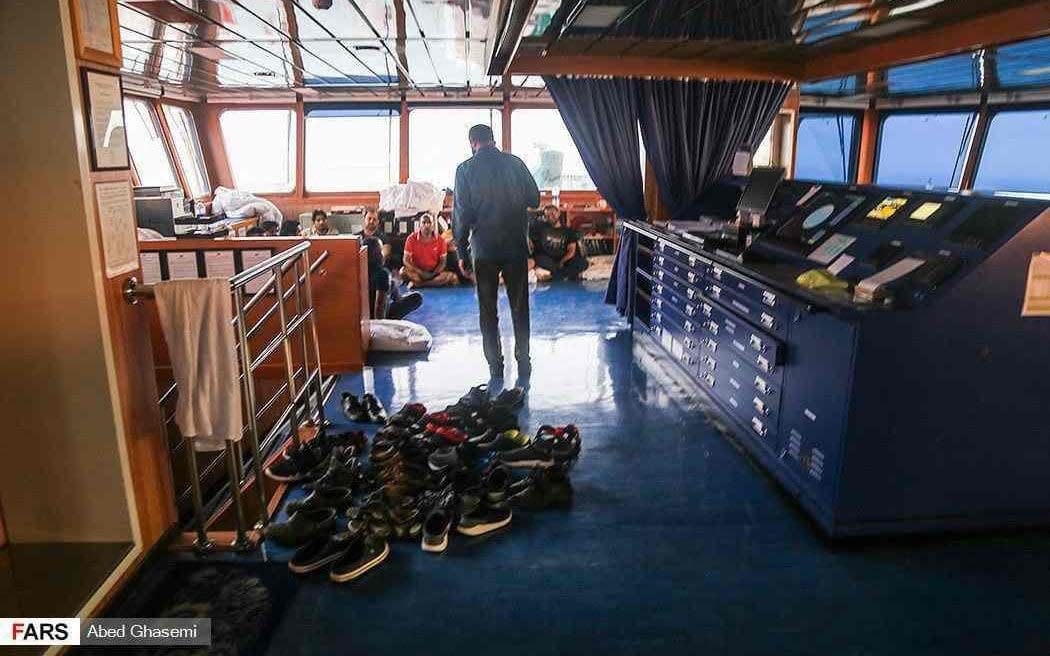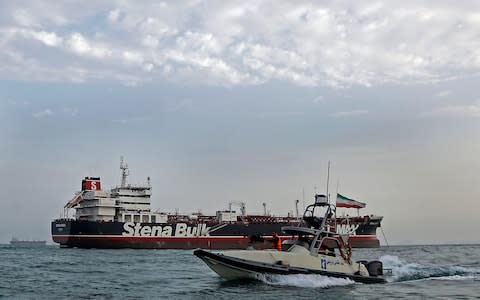Jeremy Hunt announces joint European task force to protect ships in Gulf after Iran's tanker seizure

Jeremy Hunt, the Foreign Secretary, on Monday announced a joint European maritime mission on the Strait of Hormuz in the aftermath of a British tanker seizure in the Gulf.
In a statement to the House of Commons he said the UK will ask all British flagged ships to give notice of intention to pass through the Strait of Hormuz so they can be given protection.
It followed a signal from the United States that it would not aid Britain in the Persian Gulf, in a fresh sign of disagreement between the allies over Iran policy.
Asked about any possible US role in the tensions in the Strait of Hormuz, Mike Pompeo, US Secretary of State, said on Monday that "the responsibility ... falls to the United Kingdom to take care of their ship".
The US has been attempting to build a “coalition of navies” to coordinate efforts to protect ships in the Gulf, which the UK has not said it will participate in.
It is understood Britain is hesitating over fears such a move could be seen by Tehran as provocative, at a time when the Government wants to avoid being dragged into more confrontation.
Iran seized the British-flagged Stena Impero on Friday in retaliation for Royal Navy marines impounding an Iranian supertanker off Gibraltar earlier this month on suspicion it was transporting oil to Syria in violation of European Union sanctions.

It is thought that British authorities had been pressured by the US, which has its own sanctions on Iran and is keen to stop as much of its oil exports as possible.
Mr Hunt said he had spoken to the Iranian foreign minister, Javad Zarif, as well as the foreign ministers of Oman, the United States, France, Germany, Italy, Finland, Spain and Denmark.
He added he had "raised the security level for British-flagged shipping to Level 3, advising against all passage in Iranian waters and, for the moment, in the entire Strait of Hormuz."
Mr Hunt said: "We will now seek to put together a European-led maritime protection mission to support safe passage of both crew and cargo in this vital region."
He added that the UK would not be joining the US's "maximum pressure policy" on Iran, saying: "we remain committed to preserving the Iran nuclear agreement."
He said he would discuss how this would complement US proposals in the area.
Spanish newspaper El Pais reported over the weekend that the US alerted Madrid that the Grace 1 was heading towards its waters.
It has also been reported that after Spain denied a request by Washington to seize the ship, the UK then accepted, despite reservations it would escalate already heightened tensions.
The US has pursued a policy of maximum pressure on Iran after pulling out of the 2015 nuclear deal; reimposing sanctions while designating the powerful Revolutionary Guard Corp as a terrorist entity.
The UK on the other hand has attempted to deescalate tensions and keep the accord alive.
It agrees with other European signatories to the deal that it is the best chance of limiting Iran’s nuclear ambitions.
Following discussions with Mr Hunt on Sunday and French Foreign Minister Jean-Yves Le Drian on Monday, Heiko Maas, Germany's Foreign Minister, said that alongside handling the dangers in the Strait of Hormuz, Europe will continue to play the "diplomatic card".
Mr Maas said that "what we need is deescalation, and my British and French colleagues have the same opinion."
He said that Germany does not want to join the US’s strategy.
Sir Michael Fallon, the former defence secretary, said over the weekend that Britain could have joined with the US and other nations in protecting shipping in the strait, while distancing itself from the Trump administration's decision to tear up the nuclear deal.
"We don't have to support Trump's position to recognise Britain and America have to be part of an international protection force for the international waterway," Sir Michael said.

